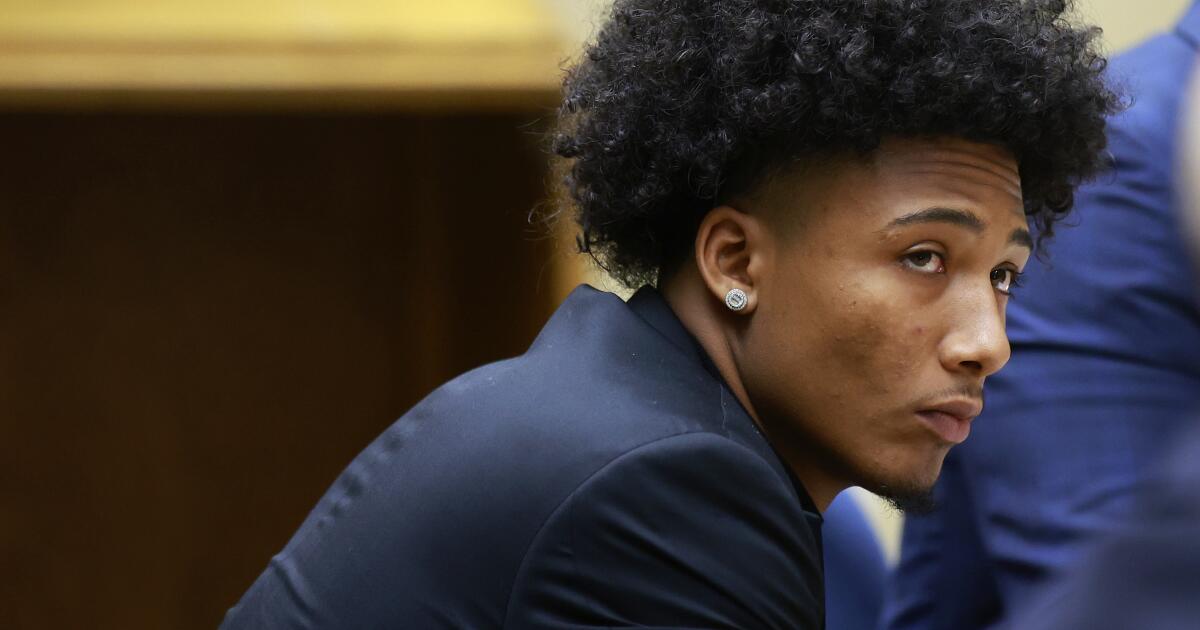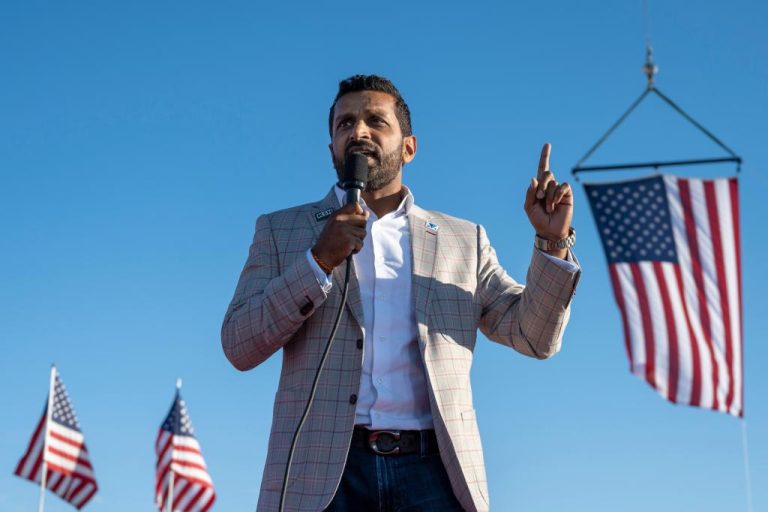
Former San Ysidro High School basketball star Mikey Williams reached a plea agreement in his gun case on Thursday that could result in a misdemeanor conviction and no prison time.
The deal was finalized in El Cajon Superior Court at a readiness hearing ahead of a Dec. 14 jury trial. Williams faced nine felony counts for allegedly firing a handgun into an occupied vehicle during a March incident at his Jamul home. A judge ruled in an October preliminary hearing that there was substantial evidence to proceed to trial.
On Thursday, Williams pleaded guilty to two felony counts before Judge Roderick W. Shelton — one for making criminal threats and one for personal use of a firearm in commission of a crime.
The firearm charge will be dismissed and the criminal threat charge reduced to a misdemeanor at his Aug. 12 sentencing if Williams completes classes in anger management and gun safety, cognitive behavioral therapy and performs 80 hours of community service. In addition, any criminal offense other than a minor traffic violation could invalidate the deal.
“I’ve spoken to Mikey a lot,” said Randy M. Grossman, a veteran criminal defense attorney who joined Williams’ legal team last month. “He accepts full responsibility for his actions on that night in March. He was an 18-year-old kid. He felt threatened when a car full (of people) came there. He recognizes the mistakes in judgment he made. He vows for that never to happen again.
“He wants to continue to be a role model for kids out there. What he did was wrong, and he wants to caution them not to make the same mistakes he made.”
In a video posted on social media from outside the El Cajon courthouse, Williams said: “All glory to God. I’m just happy I made it out (of) this situation, you know? I’m just excited to get back to the (basketball) court.”
The two felonies carry a maximum of 13 years in prison. The misdemeanor has a maximum of one year, but Grossman said “no custody is anticipated,” nor does he expect the District Attorney’s Office to request it.
“The kid lived a crime-free life for 18 years,” Grossman said. “I don’t anticipate something happening at this point. I think he’s going to be extra careful.”
The bigger question might be when or if the University of Memphis, where the 6-foot-3 guard committed to play after a record-breaking high school career, allows him to join the team. The Tigers are six games into the season, and Williams has yet to practice with them while remaining in California during the case.
The university issued a statement in September saying that while Williams was enrolled in online classes for the fall semester and remained on the official roster, he could not participate in team activities “until his pending legal process in California is complete.”
Grossman said he spoke with Memphis coach Penny Hardaway and Athletic Director Laird Veatch in the past week as the plea agreement was being negotiated.
“They are still very supportive of Mikey,” Grossman said. “They believe in him, so we’ll see. … I don’t know how they’re going to view this now. On the one hand, you could say the case is still pending because he hasn’t been sentenced. On the other hand, he has pled guilty. Maybe they say pleading guilty to a felony disqualifies him currently, but a misdemeanor they don’t have an issue with.”
Often, there is a full year between a guilty plea and sentencing in cases with deferred judgment. Williams’ legal team worked with prosecutor George Modlin and the District Attorney’s Office to shorten that to less than nine months.
“We designed the sentencing date in the middle of August, a couple weeks before classes start (for the 2024 fall semester),” Grossman said. “This year has already kind of gone on, so whatever their position is I do believe he will be eligible and ready to play for them next time around.”
The alleged incident happened shortly before midnight on March 27, when five people plus a driver came to Williams’ 3,500-square-foot home in a white Tesla. The visit was prompted by a high school student who was dating JJ Taylor, a San Ysidro teammate who lived there with Williams and also committed to play at Memphis.
The teen girl, whose name was not disclosed in the preliminary hearing because she is a minor, said she went inside the house to meet Taylor, but Williams appeared upset they had come and began issuing threats.
“(Williams) said we’d leave with bullet holes and we’re up in the mountains so no one would be able to save us or help us,” the girl testified in the preliminary hearing. “He was threatening us with all kinds of threats. I was trying to calm the mood down, and so was JJ.”
Another witness testified: “Mikey claimed he was going to get his gun. Then Mikey disappeared in the house.”

Deputy District Attorney George Modlin.
(Brittany Cruz-Fejeran)
Multiple witnesses said they saw Williams emerge from the house holding a handgun with a red laser as they got in the car to leave. No one testified they saw Williams discharge the gun, only that the Tesla came under fire. The prosecution produced photos showing four bullet holes in the trunk and rear window.
Grossman noted that Williams technically did not plead guilty Thursday to firing the gun. The plea, Grossman said, was for issuing a threat, and brandishing a firearm was part of that threat.
Grossman, who serves as chairman of the board of trustees for the Thomas Jefferson School of Law in San Diego, joined Troy P. Owens as co-counsel in late October. He said the plea agreement involved input and approval from District Attorney Summer Stephan and Chief Deputy District Attorney Dwain Woodley.
“We’re very happy with the result,” Grossman said. “Troy Owens and I felt this was a defensible case. But I tell you what, juries can be unpredictable. Our goal was to get Mikey back on campus and back on the basketball court as soon as possible.”







